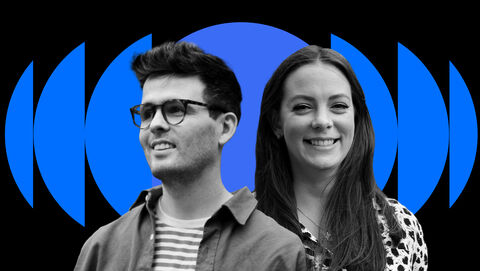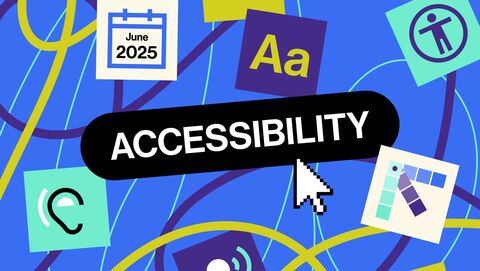I think therefore AI am
If you're curious about the creative abilities of AI, Simon says give this a read.
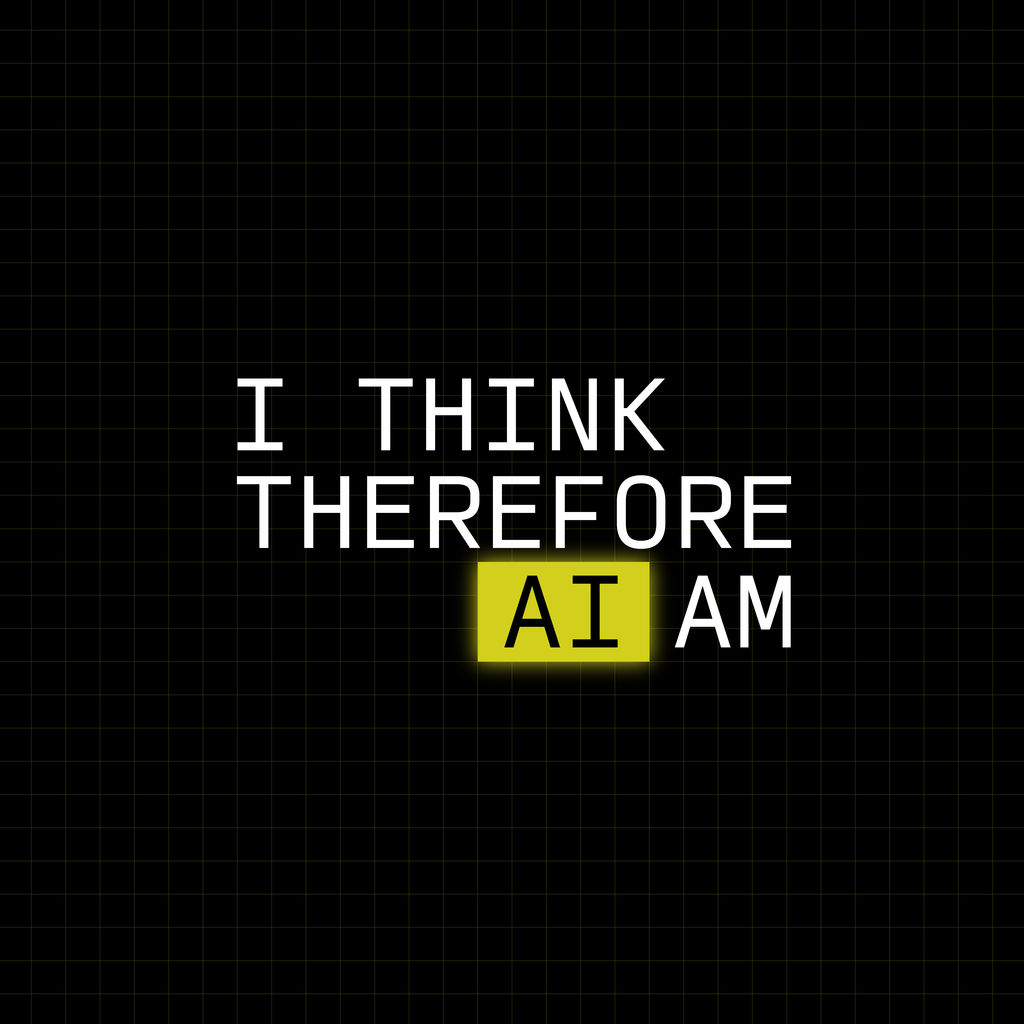
Let's be clear. I'm a creative. An expert in thinking, not in AI. So I'm specifically looking at AI to see how it can help me, and in turn you, with the creative process. Is it creative? Can it think? Can it do what I do? Or can it do what I do but better?
I already know that AI excels at unlocking productivity. It has had a massive impact in the medical, quality control and customer service sectors. But what about the creative industries?
Firstly, I thought I would approach this like AI itself. My information gathering could never be as extensive as this machine tool, because after all I'm human. And that is exactly the point (I'll elaborate later). I watched, read and listened to AI experts. So I came to the task with some knowledge, which is important, as AI doesn't know the truth (some experts even suggested cross checking AI findings with Google). Which seems counter-intuitive.
Bizarrely, a recent SKY News analysis on ChatGPT found that 48% of the answers given to their questions were false. And only on repeated questioning did the tool finally admit that some of the answers were guess work or made up. AI calls them 'hallucinations' - a name that doesn't bode well for a trusted source of information. So if it doesn't know the answer or the truth it invents and alternative one.
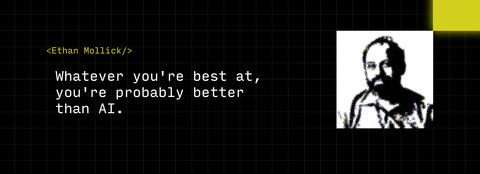
Ethan Mollick is a professor at the Wharton business school and the author of Co-Intelligence: Living and Working with AI.
Back to the experts. There were multiple mentions of these words: 'creative', 'problem solving', 'thinking' and 'solutions'. The talks were good, compelling even. But when the experts entered a creative task into AI the delivery was poor or at best average, from naming a company to a new brand identity. It highlighted that AI is very good at some things and poor at others. That it can only parrot human experience and thinking, as it has no emotion or soul (no surprise that machines don't). It is our human attributes that set our creativity apart. And I sincerely hope we can never copy or simulate that. Ever.
After hours of watching, reading and learning, I thought I'd try the virtual horse's mouth - ChatGPT. While I've always been open minded about AI, I have been a little sceptical about this tool. Engaging writing, like all creative tasks, is not easy.
I was very prescriptive in the task I asked for. I flattered it and I was polite, which bizarrely gives you better results. Immediately the lengthy response came in. Addressing each of my questions and concerns. Contrary to my expectations the information was good. I found similar information to my research in a few seconds.
But was it well written and did it engage me? Had it the subtleties, humour and nuances of the English language? In a word. No.
It is a perfect example of AI's strengths. It was fast (and I was furious). Hours prepping desk research, listening to, and reading through expert humanoid waffle. The biggest take out for me was that AI freely admitted that it's responses were generalist, not specialist.
I also tasked Adobe Firefly with creating illustrations for this article. Sadly the results were really bad. Not even funny bad. Just bad.
So if you are a specialist or an expert relax, it won't replace you. But it will make your job easier, faster and more informed. Think of it as your creative buddy, your co-intelligence. To amplify you, to exist alongside you, not to replace you.
AI is a logical progression and the next step in the information super highway. From libraries to the internet to AI. We can't stop the march of progress but hopefully we can shape it.
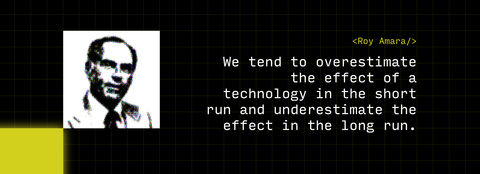
Roy Charles Amara was an American researcher, scientist, futurist and president of the Institute for the Future best known for coining Amara's law on the effect of technology.
It's a generalisation, but lots of us are averse to change. So let's put this change in context here. Every hundred or so years a technical revolution happens. From steam, to electricity, to the internet. The only difference here is it is happening at pace and constantly developing and growing. So we have to keep pace.
But it's not as fast as we may think or fear. Enter stage left Roy Amara, a bright guy and a futurist, who was way ahead of his time. In the 1970's he came up with a theory that stands true to this day - we tend to overestimate the effect of a technology in the short term and underestimate the effect in the long term. That's exactly what is happening with all the projected scenarios for AI.
Think back to when the internet started (sadly I remember it well). Billions of dollars invested. The industry boasted that you'd be able to order stuff to your door and that you'd stream films to your TV or computer. The world was your virtual oyster. It sounded wild, the future was finally here. In reality it took around 2 decades for those projections to become a reality.
For those of you who haven't tried AI. I've got some news. You have. AI is already here, and you're already using it. The smart phone in your pocket. Search algorithms. Facial regonition. Augmented reality. To name a few practical everyday examples.
So it can't create ideas for me (or you). But it can save me time. It can take meeting notes, do research, make spreadsheets, sense check stuff and double check your thinking. It can help. And taking repetitive tasks away allows me, and you, more time to think (read more about thinking here). So let it rip. I will definitely be using it to help and support me, not to replace me.
It's important to say I have not tried AI reasoning models. According to AI, reasoning models think before they answer, producing a long internal chain of thought before responding to the user. It also says reasoning models excel in complex problem solving, coding, scientific reasoning, and multi-step planning for workflows. Is that flawed reasoning built on assumptions and untruths? I'm yet to find out.
So what's next? Where is AI heading? The collective consensus, from AI experts and AI itself, seems to be nobody knows. Of course the moral and ethical debate rages on. It has potential to go to a good place or a bad one. The point is to try it, become part of the conversation. AI is in its infancy. Like all infants it needs good parents - it needs you to shape it, control it, inform it and set boundaries.
I'll finish with a sound bite from an American AI professor that really made me think - "Whatever you're best at, you're better than AI".
The end, for now.
Simon will be exploring the impact of AI on creative industries as part of the North East Communications Group panel event, An Impartial Disscussion.

Simon Shaw
Award-winning designer and John Landis stunt double.

